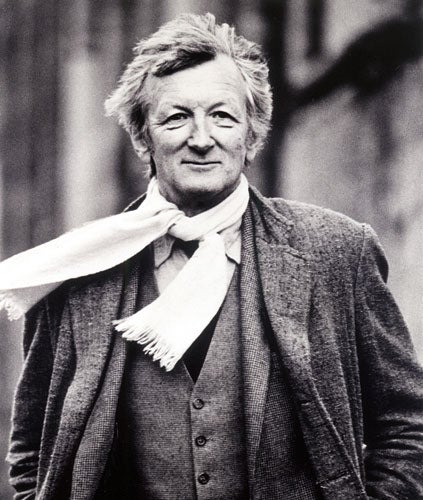John Michell: Expert on ancient knowledge and pioneer of the New Age

John Michell was a great British antiquarian, the veritable successor to John Aubrey, the 17th-century explorer of the megalithic temple at Avebury, William Stukeley, who studied Stonehenge in the 18th century, and Alfred Watkins, who in the early-20th century rediscovered ley lines – the lines of earth energy running between ancient sites.
Michell's research was characterised by his belief, stated in the preface to his The View over Atlantis, that: "The important discoveries about the past have been made not so much through the present refined techniques of treasure hunting and grave robbery, but through the intuition of those whose faith in poetry led them to scientific truth." His life's work was to use his own dazzling intuition and ability to communicate complex scientific and philosophical ideas, through lectures and some 40 books, and to bring ancient knowledge to a wider public, much like a philosopher in the Platonic tradition.
Michell was born in London in 1933 and was educated at Eton College and Trinity College, Cambridge, where he read modern languages. He served in the Royal Navy and later joined the civil service as a Russian interpreter.
His writing career began in 1967 with the publication of The flying saucer vision: the Holy Grail restored. Emerging at the height of UFO interest, and a year before Erich von Däniken's Chariots of the Gods, this work proposed the idea that flying saucers were not necessarily craft from other planets. Instead, they could be seen as emanations of the human psyche, archetypes in Jungian terms, which were being observed especially at sites with ancient religious significance. As Michell put it: "The strange lights and other phenomena of the post-war period were portents of a radical change in human consciousness coinciding with the dawn of the Aquarian Age."
In 1969 he published the first of his works on sacred geometry, The View over Atlantis, where he examined the research of Alfred Watkins, reawakening and developing the ideas from Watkins's 1925 book The Old Straight Track. Michell showed how the rediscovery of ley lines and the patterns both within and between ancient monuments demonstrated traces of what he called "a gigantic work of prehistoric engineering".
In May the same year, Michell established the Research into Lost Knowledge Organisation (Rilko), together with founder members Keith Critchlow and Mary Williams. The organisation was headed by Commander G.J. Mathys, with Janette Jackson as honorary secretary and Elizabeth Leader as archivist. Rilko, of which the present author is a member, continues its charitable activities to this day, in organising lecture series and republishing previously lost or ignored works of ancient wisdom.
Alexander Thom's research into prehistoric monuments, espoused by Michell, showed that a measure known as the megalithic yard – close to the modern yard – was being used by the builders of old. Michell's desire to preserve traditional weights and measures led to his establishment, in 1970, of the Anti-Metrication Board. Speaking about this later on, Michell was proud to note that this "radical traditionalist" organisation had "outlived its bureaucratic adversary, the Metrication Board, by several years."
The book City of Revelation (1972) built upon the success of The View over Atlantis. Here, evidently inspired by an obscure work from the Victorian author William Stirling, he described how the monuments of the ancient world were designed according to the principles of gematria. This science associates the numerical values of the names of the gods with the dimensions of the temples in whose honour they were built, and in turn links those dimensions with the measures of the cosmos. "He is a genius," a Time Out review of this book noted at the time, "short-circuiting established channels of thought and offering a brilliant network of his own." Michell subsequently provided a preface to the 1974 edition of Stirling's work The Canon, re-published by Rilko.
Michell's 1977 book, A Little History of Astro-Archaeology, reviewed the science of the same name from Stukeley's time onwards. Here Michell observed wryly how the view of the field, like much of the other research he pursued, has evolved over the years "from lunacy to heresy to interesting notion and finally to the gates of orthodoxy."
In 1990 Michell founded The Cereologist, a magazine on crop circles and related matters, which ran a total of 36 editions through to 2003. For Michell, research into the crop circle phenomena followed on naturally from his existing investigations into megalithic monuments and sought answers to how and why these peculiar formations came about.
The book Who Wrote Shakespeare? (1996) treated the controversial authorship question in a typically balanced and reasoned way. He leaned towards a hybrid Baconian/Oxfordian theory, whereby a group, centred on Francis Bacon and including the Earl of Oxford, may have been the authors.
Aside from his writing, Michell was also a painter. An exhibition of his watercolours and geometrical paintings was held during 2003 at the Christopher Gibbs gallery in London.
The April 2009 edition of the Fortean Times contains a long article about Michell's life and work, which he just missed seeing in print.
Of all his works, Michell's magnum opus is probably The Dimensions of Paradise: the proportions and symbolic numbers of ancient cosmology (2001). In this book he furthered his thesis that the measures used by prehistoric man, his constructions, his gods, and the universe itself are all intimately and inextricably related. One can hope that he is now enjoying the next stage of his cosmic journey, in researching the dimensions of Paradise for himself.
Marcus Williamson
John Michell, writer: born London 6 February 1933; married 2007 Denise Price (one son from a previous relationship); died Stoke Abbott, Dorset 24 April 2009.
Subscribe to Independent Premium to bookmark this article
Want to bookmark your favourite articles and stories to read or reference later? Start your Independent Premium subscription today.

Join our commenting forum
Join thought-provoking conversations, follow other Independent readers and see their replies